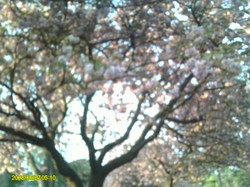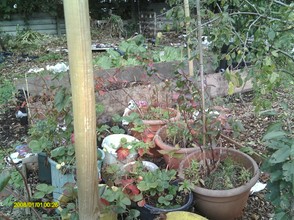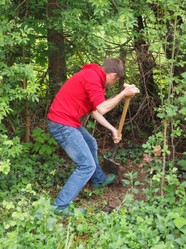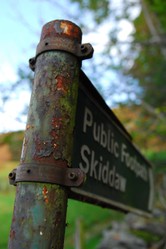For many years from the Victorian period onwards farmers and gardeners used powerful chemicals, such as strychnine and arsenic to destroy pests on their crops,and ever more complex chemicals, such as DDT, were developed during the twentieth century, but in the nineteen forties the organic movement developed as a critique of this poison-based agriculture. The founders of the organic movement came up with the novel idea that the soil is a living thing and that farmers should cultivate the soil before they cultivate their plants. Slowly organic ideas have moved from being seen as the preserve of cranks into mainstream agriculture and horticulture.

Organic Cultivation
by frankbeswick
The organic movement works on the principle that you should feed and protect the soil so that the soil will feed you.
The picture above
This picture shows my organic garden, looking through the fruit tree section over containers towards the compost heaps. Note the woodchip mulch used to prevent weeds. Note also that the wood from which the raised beds are made is recycled scrap.
The Living Soil
The central idea of organic philosophy can be summed up as the living soil. Soil is not an inert mass of brown stuff, but is an ecosystem of such complexity that no one yet fully understands it. Take any cubic metre of soil, analyse it, and you will see that it contains a vast variety of life forms. These range from bacteria and microscopic fungi, through to worms and insects. These all dwell in a dark, rich, warm matrix composed of decaying plant and animal matter, faeces,water, oxygen, minerals, rock fragments and humus. See a black soil and you have an instinctive awareness of its fertility, and the blackness therein comes from humus, a complex organic colloid which is the last stage of decay of living matter. It is a glue that binds the soil particles together. It keeps minerals in the soil, and importantly, holds water and thus prevents run-off with the leaching of nutrients ensuing on this occurrence.It also keeps the soil warm, as it retains heat.
The soil contains friends and foes. There are microbes and insects in the soil dangerous to plants, but there are many friends, such as worms, whose tunnelling aerates the soil, allowing oxygen to reach plant roots. The organic insight is that the soil as a whole is positive. The soil system works overall to the benefit of the plants growing in it. Therefore, cultivate the soil. Regard the soil as part of the living stock on your farm/garden, and know that as you cultivate it, you are cultivating your plants. Organic growers welcome the life of the soil and regard it as an ally in the growing process, not an enemy that is competing for resources.
The organic movement dislikes herbicides and pesticides because poison kills friends and foes alike. Poison sprays for example, might kill ladybirds, which eat the aphids that harm your plants. Herbicides can be systemic or residual. Residual herbicides stay in the soil and can be the source of doubts about their effect on other creatures, if they are taken up by plants, which are then consumed by animals, including humans. Systemic herbicides are absorbed through the leaves and move through the plant, killing it. Glyphosate is one such herbicide, and it has the advantage of breaking up when it touches soil, though many green activists are very wary of the claims made for it. Residual herbicides are never acceptable; and systemic ones only permissible in emergency, according to organic principles.
Pesticides poison animals, such as insects, and these have a habit of killing useful insects as well as harmful ones. I cannot think of a time when pesticide use would ever be approved, and I have never used any. The appalling story of DDT, which poisoned insects but stayed in the food chain is an example of a residual pesticide that had human health implications.
The Organic Movement
 | Organic Gardening Fully revised and updated to reflect eco-friendly thinking and techniques, Organic Gardening is a classic guide to growing flowers, fruit, and vegetables the natural, chemical-f... |
 | Organic Gardening Beginner's Manual *** #1 Amazon BESTSELLER in Vegetable Gardening ***Here's the ultimate "Take-You-By-The-Hand" beginner's manual for creating and managing your own organic garden. Even if you kn... |
Feeding the Soil
Not content with protecting the soil from harmful poisons, the organic movement insists that it be properly fed. Fertiliser is not high on the organic agenda, as organic growers believe that merely adding chemicals to the soil does nothing to preserve its life. You can fertilise a dead soil, but fertiliser adds no humus. It is important to note that humus breaks down and so needs constant replenishment, which is done by organic methods, outlined in the next sentence. As opposed to fertiliser use, organic growers use natural sources of nutrients, such as manure. Manure is strictly speaking anything that you add to the soil, but the term is used mainly for dung. This is a great soil enhancer, though it should be well-rotted before it is applied, otherwise it can damage plants.Other possible soil feeders are compost and leaf mould, rotted leaves. These should not be out into the compost heap but rotted in their own pile, as compost is created by bacterial action and leaf mould by fungal action.
The aim of using these organic methods is to not only feed the soil with nutrients, but to preserve its structure. The structure of a soil is the variety of particles therein. A soil with a rich variety of different types, shapes and sizes of particle will have a wide range of spaces wherein oxygen and water can be retained, and there will be many surfaces to which mineral nutrient components can attach themselves. Critical to a well-structured soil is humus, which glues it all together. Compost and manure are excellent for the creation of humus, and this is why organic growers use it.
The problem of peat must be raised. Peat is a great aid to soil structure, but organic growers in Britain are very much opposed to its use. This is because it has to be extracted from peat bogs, which are a rare and precious landscape type in this island, and extraction is destroying them. However, in the neighbouring island of Ireland peat is a precious resource to be extracted and used, and in country short of coal and oil, peat extraction is a necessity. I do not see a reason to refrain from using Irish peat, though there are good reasons to refrain from the use of British peat, and whether or not to use peat depends upon the country you are in. There is an ecologically acceptable British version, which is peat washed down into waterways and extracted as part of the maintenance process, and no bogs are damaged in its collection.
A useful element in any soil is clay, as clay particles are the smallest of soil particles, and because of this a clay soil has a far larger surface area for the absorption of nutrients than sandy soils do. Think of it this way: a large number of little spheres have a greater surface area than one large one. Thus organic growers, like other growers, will add clay to their soil if they can obtain it.
Fertilising the soil
 | Hoffman 20505 Dehydrated Super Manure 4-2-3, 5 Pounds 4-2-3 Dehydrated supermanure is easy to apply pelletized form. Improves soil texture; builds humus content without burning. Produces outstanding results in flower and vegetable ... |
 | Earthworm Castings, 15 lb Earthworm castings (1-0-0) are one of nature's most abundant and effective fertilizers. A rich, odorless, all-natural organic product that is extremely cost-effective because yo... |
Organic Pest and Weed Control
How to deal with weeds without weedkiller is a major issue in organics. Simply spraying weeds can results in the development of superweeds, which have been bred from herbicide resistant crops, and they can be a bigger problem than the original weeds.This is also the case with pests. There are techniques.Already the glasshouse white fly has in southern England been so heavily sprayed with insecticides [pesticides that attack insects] that only pesticide resistant strains have survived, and now pesticides are not working with them.
Favoured by organic growers is cultivation. Weeding by hand or machine eliminates weeds and has the added advantage of enabling you to compost the weeds, which will eventually be recycled on your land. Some growers also use weed-suppressing mulches, such as a layer of leaves or black polythene. These two are particularly useful in winter. I am using both at the moment [January] as they deprive perennial weeds of light and so kill them, and this is a good time to do light deprivation, as no crops are growing at present. Some growers also use a flame gun to burn off weeds, but it can get out of hand. I once had to use up some of my precious water supply when flame gunning weeds, as some woodchip caught fire one summer. No serious damage was done, but a lesson learned.
Encouraging predators is an organic technique. Blue tits are great for killing certain pest insects, which form the bulk of their diet. Hedgehogs and ducks eat slugs and snails. Keeeping chickens can anable you to use them as chicken tractor, whereby the chickens roam the rows between vegetables pecking at the ground, Slugs stand no chance. Glass house growers often purchase specially bred insects and arachnids to deal with specific pests, The list is beyond the scope of this general article.
organic pest management
 | 33 Ways To Kill Pests Without Pesticides Kill Any Insect, Spider or Bug Fast With All Natural Pes... How To Kill Any Bugs Without Pesticides or Toxic Chemicals> Learn The Secrets of a Pest Control Expert Who Knows The Power of Organic Pest Control Everything you've been taught ... |
Conclusion
If you are a commercial grower you have to apply to use the organic trade designation, and to do this you must go through a process that takes two or more years. You must have been managing your land organically for two years and must submit to inspections from the Soil Association, who can arrive unannounced. You must not use herbicides and pesticides, or if you need to, you must apply for permission, otherwise your organic status is lost. You must submit detailed management plans to the Association.
On the other hand, if you are a private individual, you can go organic without seeking permission, as long as you do not sell your products as organic.
There are arguments about whether organic produce tastes better than chemically farmed produce does, but this issue is a red herring. The reason for going organic is that organic methods of cultivation are sustainable, they save the earth, while the non-organic methods cannot continue for ever. One day, when the oil for fertiliser production runs out, we will be back to organic methods, whether the economic establishment likes it or not.
You might also like
To Dig or Not to Dig; That Is the QuestionThere is currently a controversy in gardening about the no-dig method.
The Reforestation of SkiddawBritain's project of renewing the Atlantic rain forest is taking a further st...




 Darkness over the Earth the skies darkened when Jesus was crucified22 days ago
Darkness over the Earth the skies darkened when Jesus was crucified22 days ago
 TheThousand Year Gardenon 11/26/2025
TheThousand Year Gardenon 11/26/2025
 Women of the Gospelson 10/11/2025
Women of the Gospelson 10/11/2025
 Religious Gardenson 08/25/2025
Religious Gardenson 08/25/2025



Comments
I do not think so.
Your comment March 2, 2023, in answer to my previous, same-day question causes me to consider woodchip mulch, which I already know and love.
But have you found a certain kind of woodchip mulch to be more effective than others? In other words, might there be a particular tree species that produces the bestest -- ;-D -- woodchip mulch?
No specific plant stands out. I have advised my son to put woodchip mulch around his fruit trees. He has his own allotment now , the young men take over from the old, and I help with funding and advice. He does not need my advice with fruit, but he needs it with vegetables..
The second and the third sentences in your second subheading, The picture above, notes "the woodchip mulch used to prevent weeds" and that "the wood from which the raised beds are made is recycled scrap."
Would there be a particular woody plant whose wood would be preferred for woodchip mulch and for recycled scrap?
Good, I am glad that you find the article useful. A useful addition to any organic gardening strategy is rock dust, which is ground granite. You do not need much, just an application every few years is enough.
Thanks for the tips. I cultivate organic green coffee at home and it's been such a great experience. I have to confess that I was not really engaged to this organic movement, but now I can see the benefits.
This is what I cultivate at home: http://www.trusera.com/green-coffee-s...
The problem is known as fertiliser scorch or fertiliser burn. It is caused by reverse osmosis. Normally chemicals flow into the plant from the soil through osmosis, but when the soil chemical solution becomes too strong through excess fertiliser application chemicals [nutrients] flow the other way out of the plant. These chemicals flow out along with water, so the plant dessicates and dies.
What is interesting to know was how small an overdose can have an effect on a whole bed of plants
Great article, we had a rose garden years before and my mother accidentally used a slight overdose of fertilizers on them. All plants died very soon which shows how toxic these things are. I never use any chemicals in my plants.
Yes, if you read The Lost Gardens of Heligan, the book mentions how the Victorians poured all sorts of poison onto their gardens, but many of the kinds of poison broke down in the soil after a while. In later years more enduring poisons were developed, for example DDT and the dreadful organophosphates.
Hi Frank, I didn't know that toxic pesticides were used so early. I always thought this was a later development. Great article and I'm pinning it to My Eating Organic and Avoiding GMOs board.